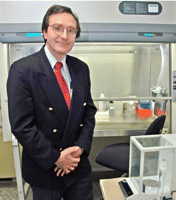Gene Linked to Suicide Risk in Those With Eating Disorders
Abstract
Of all the liver enzymes involved in drug metabolism, the one dubbed CYP2D6 is especially crucial for metabolizing psychotropic medications.
And when people inherit more than the normal two copies of the CYP2D6 gene, they break down psychotropic medications very rapidly.
Now Spanish scientists have found that especially rapid CYP2D6 metabolizing is more common in people with eating disorders who have made a suicide attempt than in people with eating disorders who have not made such an attempt.
So having an ultra-rapid CYP2D6 enzyme might be a risk factor for attempted suicide in individuals with eating disorders, the scientists believe.
The study was led by Eva Penas Lledo, Ph.D., an associate professor in psychological medicine at the University of Extremadura Medical School in Spain, and colleagues. Their cohort included 203 women who had been diagnosed with an DSM-IV eating disorder. As a part of taking the Diagnostic Interview Schedule, subjects were asked whether they had ever attempted suicide. Thirty-eight said they had made such an attempt. All of the women had also been genotyped for the CYP2D6 gene. Seventeen possessed more than the normal two copies of it and thus were extremely fast CYP2D6 metabolizers.
The scientists found that 18 percent of subjects who had attempted suicide were ultra-rapid metabolizers, while only 6 percent of those who had not attempted suicide were. The frequency of ultra-rapid CYP2D6 metabolizing among those who attempted suicide was also markedly greater than that reported for the general population in Spain, which was 5 percent.
Although the means by which an ultra-swift CYP2D6 enzyme might contribute to an increased risk for suicide attempts are not known, Lledo and her group proposed two possible mechanisms in their report, which was published in the July MolecularPsychiatry. An ultra-rapid CYP2D6 might diminish a person's response to antidepressant medication. Or it might alter the brain's usual use of the neurotransmitter serotonin since, in previous research, they found that it may be involved in the brain metabolism of serotonin.

Jose de Leon, M.D.: "Much larger samples are needed to definitively establish an association between the CYP2D6 ultra-metabolizing phenotype and suicide attempts."
Two other studies have also linked ultra-rapid CYP2D6 metabolizing with suicides, Jose de Leon, M.D., an associate professor of psychiatry at the University of Kentucky and an expert on psychiatric pharmacogenomics, told Psychiatric News.
Swedish investigators described a small increase in the prevalence of ultra-rapid CYP2D6 metabolizing among individuals who had killed themselves compared with those who had died from natural causes. And German researchers found that among subjects with depression, those who were ultra-swift CYP2D6 metabolizers had more suicidal symptoms than did those who were not ultra-swift CYP2D6 metabolizers.
When those two studies are combined with the new one, it looks as if being an ultra-rapid CYP2D6 metabolizer might indeed be a suicide risk factor, de Leon indicated.
He cautioned, however, that "much larger samples are needed to definitively establish an association between CYP2D6 and ultra-fast metabolizing and suicide attempts."
He also pointed out that he has a potential conflict of interest in assessing the Lledo study since he collaborated with the authors on an earlier study, although not on this particular subject.
The study was partially funded by the European Union and the Carlos III Institute of Health.
An abstract of "High Risk of Lifetime History of Suicide Attempts Among CYP2D6 Ultra-rapid Metabolizers With Eating Disorders" is posted at <www.nature.com/mp/journal/v16/n7/abs/mp20115a.html>.



